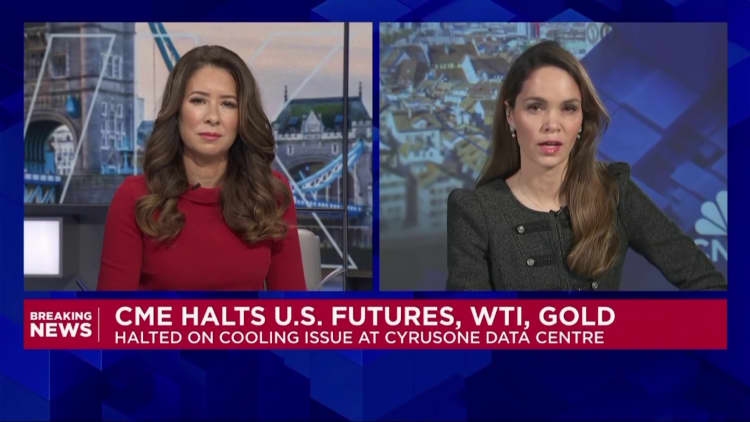The floor of the Chicago Mercantile Exchange (CME)/New York Mercantile Exchange (Nymex) in New York City. CME Group is the world’s largest and most diverse derivatives exchange.
David S. Holloway | Getty Images
Trading came to a standstill on the Chicago Mercantile Exchange on Friday following a cooling issue at one of its data centers.
“Due to a cooling issue at CyrusOne data centers, our markets are currently halted,” a spokesperson for the CME said in an emailed statement in the early hours of Friday.
“Support is working to resolve the issue in the near term and will advise clients of Pre-Open details as soon as they are available.”
The organization said it may take some time for moves in the impacted contracts to be seen once the outage is resolved.
Globex futures and options markets, foreign exchange platform EBS markets and BMD markets were all impacted, the CME added.
By 4:29 a.m. ET, futures prices for WTI crude, U.S. 10-year Treasurys and the S&P 500 were among those that had not been updated, LSEG data showed.

The CME — the largest exchange operator in the world by market value — trades futures and options across various asset classes, including agricultural commodities, energy, metals and equities.
A spokesperson for Dallas, Texas-headquartered CyrusOne was not immediately available for comment.
Emir Syazwan, a futures trader at Ninefold Trading Co. based in Malaysian capital Kuala Lumpur, told CNBC on Friday that he had been on the phone to his broker “throughout the afternoon” local time as the CME outage drags on.
Given the timing of the outage — at the end of the week, just after a major U.S. holiday and in the early hours of the morning for American traders — Syazwan said those trading in the Asian or European session would be more directly impacted.
Whether it will create “lasting distortions” in markets depends on how fast the issue can be resolved, he added.
“It’s inconvenient, but it’s not unprecedented, although this kind of event may materially alter market structure or price discovery,” he said. “Current price action already reflects markets being affected: the markets have been relatively flat and trading in a very tight range since 26 November, Wednesday, around ~10 PM EST. And until the issue is resolved, I would expect that behaviour and price action to continue.”
It’s not the first time the CME has had to shut down electronic trade. Back in 2014, technical issues shut down some trading on the CME’s Globex electronic system, impacting agricultural contracts.
Last year, trading of equities, bonds and exchange-traded funds was also temporarily halted in Switzerland after stock exchange SIX had problems disseminating data.
Syazwan’s own trades have not been impacted, he told CNBC.
“I had already anticipated the major markets — especially the U.S. indices — to consolidate until the start of next year, so I went on early holiday at the beginning of the month,” he said.

